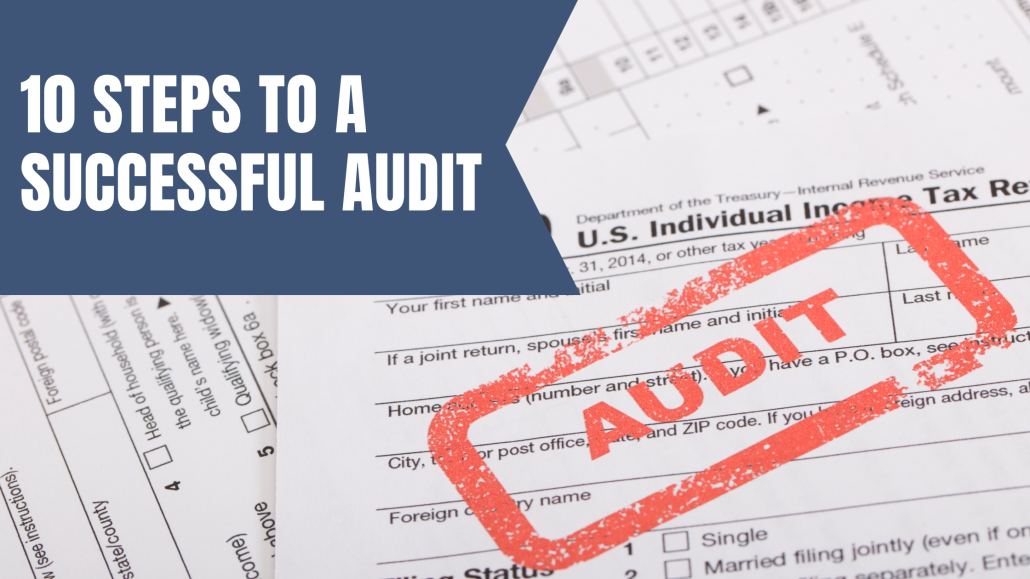
Preparing for an audit can be a complex and sometimes daunting task, especially as the fiscal year-end approaches. However, with a strategic approach and thorough preparation, the audit process can be managed effectively. Here are ten essential steps to guide you through a successful audit.
- Plan Ahead Effective audit preparation begins well before year-end. Treat the audit as a continuous process, maintaining up-to-date financial records throughout the year. Designate a key contact within your finance department to liaise with auditors, ensuring consistent communication. Having a clear, year-round dialogue with your auditors will help prevent last-minute issues and ensure a smoother audit process.
- Stay Current on Accounting Standards The landscape of accounting standards and regulations is always evolving. It’s important to keep yourself updated on the announcements and legal changes that could affect your audit process. This might entail revising your record keeping methods or offering training to your accounting staff. Consistently referring to sources such as the Financial Accounting Standards Boards site or IRS notifications will guarantee adherence to regulations.
- Monitor Organizational Changes Significant changes within your organization—such as launching new initiatives, securing new funding, or implementing new systems—can affect your audit. It’s imperative to communicate these changes to your auditors during the planning phase to ensure all relevant factors are considered and appropriately addressed.
- Leverage Insights from Previous Audits Reflect on the outcomes of prior audits to identify areas for improvement. Review past audit adjustments, internal control recommendations, and any challenges encountered. This proactive approach helps ensure that previous issues have been resolved and provides a foundation for a more effective audit preparation process.
- Establish a Timeline and Delegate Responsibilities Creating a clear timeline with assigned responsibilities is key for staying organized. Outline all tasks required for the audit, and delegate them to specific team members with defined deadlines. Prioritize complex or time-consuming tasks to ensure they are completed well in advance of the audit. This structured approach minimizes the risk of last-minute complications and ensures that all necessary documentation is ready for the auditors.
- Organize Documentation Ensuring that all your audit-related documents are managed effectively is an integral part of keeping the audit process as slick and smooth as possible. Set up a common audit schedules for cash, recejsonables, paybles and Fixed assets. It can be made in tabular form centrally where all documentation will go on one sheet. Keep sensitive information in a safe place, and maybe instead of writing out schedules every month create an automated report where applicable using your accounting software so to make getting the required schedules as easy as it can be.
- Seek Clarification When Needed If any audit requests or instructions are unclear, it’s important to seek clarification promptly. Addressing questions early on can prevent delays and ensure that all parties have a mutual understanding of the requirements. Encouraging open communication between your team and the auditors will facilitate a more efficient audit process.
- Conduct a Self-Review Before the audit begins, perform a thorough self-review of your financial statements and supporting documentation. Ensure that all year-end closing entries are accurate and that any discrepancies have been resolved. This proactive review allows you to identify and address potential issues before they are flagged by the auditors.
- Ensure Availability During Fieldwork During the audit fieldwork, it’s critical for key personnel to be readily available to provide necessary information and address any inquiries from the auditors. Avoid scheduling other major meetings during this period, allowing your finance team to focus fully on the audit. Regular check-ins with the auditors will help maintain momentum and ensure the audit stays on track.
- Review and Reflect on the Audit Results Following the completion of fieldwork, maintain open communication with your auditors until the final report is issued. A post-audit meeting is an excellent opportunity to review the findings, discuss any concerns, and gather feedback for future audits. Documenting the conclusions and lessons learned from this meeting will help you refine your audit preparation process for the coming years.
By following these ten steps, you can approach your audit with confidence, knowing that you have laid a solid foundation for a successful and efficient process. Proper planning, ongoing communication, and a commitment to thoroughness are the keys to navigating the audit process with professionalism and ease.

